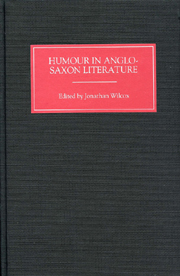Book contents
- Frontmatter
- Contents
- Contributors
- Acknowledgements
- Introduction
- Byrhtnoth's Laughter and the Poetics of Gesture
- ‘Grim Wordplay’: Folly and Wisdom in Anglo-Saxon Humor
- Humor, Wordplay, and Semantic Resonance in Beowulf
- Heroic Humor in Beowulf
- Humor in Hiding: Laughter Between the Sheets in the Exeter Book Riddles
- Sexual Humor and Fettered Desire in Exeter Book Riddle 12
- ‘Why do you speak so much foolishness?’ Gender, Humor, and Discourse in Ælfric's Lives of Saints
- A Funny Thing Happened on the Way to Heaven: Humorous Incongruity in Old English Saints' Lives
- Index
Humor in Hiding: Laughter Between the Sheets in the Exeter Book Riddles
Published online by Cambridge University Press: 12 September 2012
- Frontmatter
- Contents
- Contributors
- Acknowledgements
- Introduction
- Byrhtnoth's Laughter and the Poetics of Gesture
- ‘Grim Wordplay’: Folly and Wisdom in Anglo-Saxon Humor
- Humor, Wordplay, and Semantic Resonance in Beowulf
- Heroic Humor in Beowulf
- Humor in Hiding: Laughter Between the Sheets in the Exeter Book Riddles
- Sexual Humor and Fettered Desire in Exeter Book Riddle 12
- ‘Why do you speak so much foolishness?’ Gender, Humor, and Discourse in Ælfric's Lives of Saints
- A Funny Thing Happened on the Way to Heaven: Humorous Incongruity in Old English Saints' Lives
- Index
Summary
In many ways the Exeter Book riddles are an extended exercise in uncertainty. As riddles they are designed to leave us guessing, and as cultural artifacts they raise at least as many questions as they answer. The manuscript in which the riddles are preserved can be dated to the second half of the tenth century, and its script and its inclusion in the Exeter Cathedral library identify it clearly as a product of a monastic culture. But just as clearly, the collection contains poems which are undeniably lewd, plainly bawdy, implicitly sexual, and, even now, quite surprisingly funny. And therein lies a quandary every bit as puzzling as the riddles themselves, for despite years of critical investigation into their solutions, their sources, their possible functions, it is still unclear what these humorous, sexual poems were doing within a religious culture that forbade both sex and humor.
The riddles are found in a single manuscript, Exeter Cathedral MS 3501, which was donated to Exeter Cathedral by Bishop Leofric no later than 1072. There are ninety-five riddles in all, as numbered and edited by Krapp and Dobbie, and they appear within an apparently miscellaneous, certainly eclectic, collection of poetry that ranges in subject from the sacred to the profane. A great deal of work has tried to shed light on their place in this anthology and their role in the culture. Some critics see the riddles primarily as educational.
- Type
- Chapter
- Information
- Humour in Anglo-Saxon Literature , pp. 79 - 98Publisher: Boydell & BrewerPrint publication year: 2000



